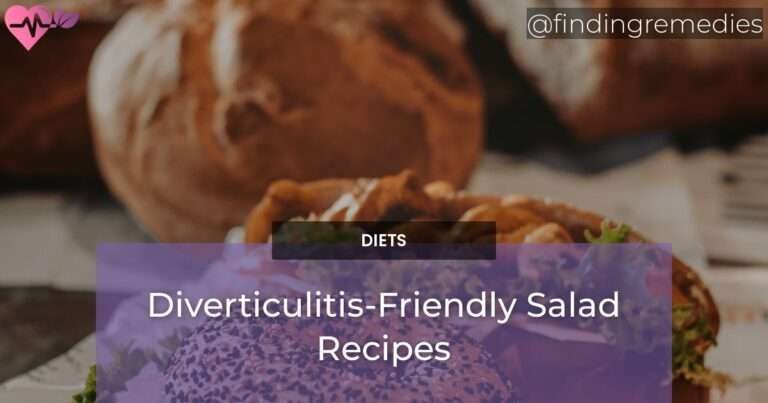When it comes to managing the symptoms of diverticulitis, a condition that affects the digestive system, incorporating the right foods into your diet is crucial. And what better way to do that than with delicious and nutritious salads?
In this article, we will explore the world of diverticulitis-friendly salad recipes, offering you a healthy option for managing your symptoms.
Table of Contents
Introduction to Diverticulitis and its Dietary Requirements
Understanding Diverticulitis and Its Impact on Digestive Health
Diverticulitis is a condition characterized by inflamed pouches in the wall of the colon, called diverticula. These pouches can become infected, leading to various digestive symptoms such as abdominal pain, bloating, and changes in bowel habits. It is important to manage diverticulitis through dietary modifications to alleviate symptoms and promote healing.
Dietary Recommendations for Diverticulitis Patients
People with diverticulitis are often advised to follow a low-fiber diet during flare-ups to reduce bowel strain. This involves consuming cooked vegetables, lean proteins, healthy fats, and avoiding certain foods like seeds and nuts that may irritate the digestive system.
Benefits of Salads in Diverticulitis Management
Importance of Low-Fiber, Cooked Vegetables in Diverticulitis Diet
Low-fiber, cooked vegetables are essential for those with diverticulitis as they are easy to digest and gentle on the inflamed digestive system. Incorporating these vegetables into salads provides essential nutrients while minimizing digestive discomfort.
Incorporating Lean Proteins for Nourishment and Healing
Lean proteins, such as grilled chicken or turkey breast, can provide the necessary nourishment and aid in the healing process. Including these proteins in salads adds flavor and satiety, making them a satisfying option for diverticulitis management.
Healthy Fats for Enhanced Nutrient Absorption and Satiety
Incorporating healthy fats, like olive oil, into salads helps enhance nutrient absorption and promotes feelings of satiety. These fats also provide essential fatty acids, which play a vital role in overall health.
ALSO READ
Salad Recipes to Help Manage Diverticulitis Symptoms
Recipe 1: Grilled Chicken Caesar Salad with Low-Fiber Dressing
– Ingredients:
- Grilled chicken breast
- Romaine lettuce
- Cucumber
- Carrots
- Low-fiber Caesar dressing
– Instructions:
1. Chop the grilled chicken breast, romaine lettuce, cucumber, and carrots.
2. Toss the ingredients together in a bowl.
3. Drizzle the low-fiber Caesar dressing over the salad.
4. Serve and enjoy!
Recipe 2: Mediterranean Quinoa Salad with Cooked Vegetables and Olive Oil
– Ingredients:
- Cooked quinoa
- Cherry tomatoes
- Cucumbers
- Kalamata olives
- Feta cheese
- Olive oil
– Instructions:
1. Combine cooked quinoa, cherry tomatoes, cucumbers, kalamata olives, and feta cheese in a bowl.
2. Drizzle olive oil over the salad and toss gently.
3. Serve and enjoy!
Recipe 3: Shrimp and Avocado Salad with Light Vinaigrette
– Ingredients:
- Shrimp
- Avocado
- Mixed greens
- Cherry tomatoes
- Light vinaigrette dressing
– Instructions:
1. Cook the shrimp and set aside.
2. Chop the avocado, mixed greens, and cherry tomatoes.
3. Combine all the ingredients in a bowl.
4. Drizzle the light vinaigrette dressing over the salad.
5. Serve and enjoy!
Recipe 4: Tuna Salad with Greek Yogurt and Portion-Controlled Nuts
– Ingredients:
- Canned tuna
- Celery
- Red onion
- Greek yogurt
- Lemon juice
- Portion-controlled nuts (e.g., walnuts or almonds)
– Instructions:
1. Drain the canned tuna and place it in a bowl.
2. Chop the celery and red onion.
3. Mix the chopped vegetables with the canned tuna.
4. In a separate bowl, combine Greek yogurt and lemon juice to make the dressing.
5. Pour the dressing over the salad and mix well.
6. Serve the salad with a portion-controlled amount of nuts.
Recipe 5: Roasted Vegetable Salad with Lean Turkey Breast and Healthy Dressing
– Ingredients:
- Roasted vegetables (e.g., bell peppers, zucchini, and eggplant)
- Lean turkey breast
- Spinach or mixed greens
- Healthy dressing of your choice
– Instructions:
1. Chop the roasted vegetables and lean turkey breast.
2. Place the spinach or mixed greens in a bowl.
3. Add the chopped vegetables and turkey breast on top.
4. Drizzle the healthy dressing over the salad.
5. Serve and enjoy!
Recipe 6: Spinach Salad with Grilled Salmon and Lemon-Tahini Dressing
– Ingredients:
- Grilled salmon
- Spinach
- Cherry tomatoes
- Cucumber
- Red onion
- Lemon-tahini dressing
– Instructions:
1. Flake the grilled salmon into bite-sized pieces.
2. Combine spinach, cherry tomatoes, cucumber, and red onion in a bowl.
3. Add the grilled salmon on top of the vegetables.
4. Drizzle the lemon-tahini dressing over the salad.
5. Serve and enjoy!
Precautions and Modifications for Individual Needs
Considering Personal Allergies and Intolerances
It is essential to consider any personal allergies or intolerances when preparing diverticulitis-friendly salads. Make substitutions or omit ingredients that may trigger adverse reactions.
Portion Control and Adjusting Salad Sizes for Individual Requirements
Portion control is crucial for managing diverticulitis symptoms. Adjust the size of the salad according to individual requirements to avoid overeating and digestive discomfort.
Adapting Recipes for Vegetarian or Vegan Diets
If following a vegetarian or vegan diet, adapt the diverticulitis-friendly salad recipes by replacing animal protein with plant-based alternatives like tofu, tempeh, or legumes.
ALSO READ
Conclusion
Embracing Diverticulitis-Friendly Salads as a Delicious and Nutritious Option
Diverticulitis-friendly salads provide a delicious and nutritious option for managing symptoms while promoting overall well-being. By incorporating low-fiber, cooked vegetables, lean proteins, and healthy fats, these salads can help alleviate discomfort and support the healing process.
Impact of Diverticulitis Diet on Overall Well-being
Following a diverticulitis diet not only helps manage symptoms but also contributes to overall well-being. By embracing diverticulitis-friendly salads and making mindful choices, individuals can improve their digestive health and enjoy a varied and satisfying diet.

